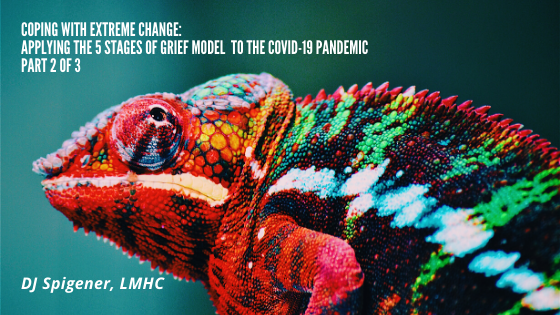Applying the 5 Stages of Grief Model to the COVID-19 Pandemic (Part 2 of 3)
DJ Spigener
Since March 2020, the U.S. has been facing a national health crisis which is unprecedented in recent history. Phrases such as “social distancing”, “personal protective equipment”, and “flatten the curve” have become ubiquitous, while many families are facing new challenges related to employment, socialization, or childcare. Our normal routines are anything but “normal” right now.
In such tumultuous and unfamiliar times, it is important to remind ourselves that the loss of normalcy, routine, and predictability we have all experienced can have a profound impact on us and those around us. Each of us may react in different ways, and at different paces, to this disruption in our lives. In order to better understand the reactions many of us may have to these profound changes, it is helpful to view the loss of normalcy through the lens of the Five Stages of Grief Model (originally created by Kubler-Ross).
We will be covering two of the typical stages of this model in today’s article: Bargaining and Depression.
- Bargaining: The Bargaining stage is all about trying to find a way to “undo” the loss we have experienced. This often takes the form of mentally replaying the events leading to the loss over and over again in our minds, desperately searching for a different word, decision, or action that could have prevented the loss we are struggling to now accept. When we acknowledge that we, as human beings, rarely have the ability to “undo” significant losses in our lives, we may also turn to a deity or higher power in hopes we can strike a bargain there instead.
During the current worldwide health crisis, Bargaining may take the form of endless arguments regarding who is to blame for originating the novel coronavirus, conflict around the bargaining of personal freedoms for public safety, or never-ending “What Ifs”. Once an individual has exhausted all hypothetical scenarios which might have led to a different outcome and realizes none of them are realistic enough to be successful, the understandable next reaction is often Anger.
- Anger: As the preceding three stages have failed to change the unacceptable circumstances a person may find themselves in following a significant loss, Anger is often the final line of opposition in our journey to Acceptance and healing. Anger is a very powerful emotion, one that makes us feel strong and justified. However, Anger also compromises our ability to think rationally and express ourselves in a genuine way.
People in this stage may appear stubborn or illogical, refusing to accept a reality that is irrefutable to everyone around them. It is important to remind ourselves that this too is a part of the Grief Process. From a psychotherapy perspective, Anger is often viewed as a “secondary emotion.” Basically, this means that in most cases where a person becomes angry, there is typically a “primary emotion” underlying that Anger which is not acknowledged or expressed. Anger can be a powerful defense mechanism for protecting us from uncomfortable truths or painful memories, but it can also blind us to our true emotions. When dealing with someone at this stage, try to focus on uncovering and relating to the primary emotions under the surface, rather than the seemingly irrational anger that is masking them.
In our next article, we will focus on the final Stage of Grief: Acceptance. Stay tuned for more information!







